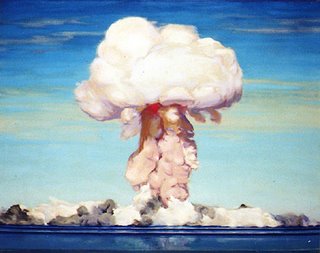Happiness is your own Bomb

So it seems that North Korea may finally be about to test a nuclear bomb. You know what's funny about acquiring these diabolical weapons? Everyone goes nuts trying to prevent another country getting the bomb, but once a state has joined the nuclear club, no one really mentions it again. Having the bomb, even just one bomb in today's world, is the equivalent of running up a banner that says: "Don't fuck with me." Certainly, in the case of Iran, being able to demonstrate nuclear capability stops any possibility of that country winding up like its neighbor, Iraq.
In his excellent first book, "The Time of Illusion," ostensibly about the Nixon Presidency, Jonathan Schell spends some time dwelling on the fascinating paradox of nuclear weapons. Our world has in many ways not yet adjusted to this paradox, even though nukes have been around since 1945. It is that the ultimate exercise of a state's power -- using nuclear weapons against an enemy or enemies -- is still too horrible an act to be worth exercising, given the ruinous outcome of even a limited nuclear exchange between two warring states. (The paradox was not yet in place when the U.S. dropped two bombs on Japan in 1945, because the U.S. was then the world's only nuclear power). So if a state is about the of ultimate concentration of power and the exercise of that power, what's the point of of using the ultimate weapon, if, as during the Cold War, to do so would almost certainly result in the destruction of the planet.
Consequently, great powers are rendered impotent, unable to use their ultimate weapons, therefore the necessity for grand-standing and posturing is even more acute. Powerful states are forced to look and act tough in other ways, usually in pointless side-show conventional wars: America in Vietnam, the USSR in Afghanistan, for, to not fight such conflicts would run the risk of losing credibility and face on the world stage.
Schell argues that by the late stage of the Vietnam War, the logic underpinning that war for Nixon and advisors had become: even if we are fighting a pointless unwinnable war, the rest of the world is going to take note of our sheer bloody-mindedness; see, we know we are fighting a pointless, debilitating, unwinnable war, but we are so hard, we can take it on the chin. Face-saving isn't an option. Schell draws out the argument that because of the nuclear weapons paradox, Nixon and other U.S. presidents before and after him, saw themselves in the strange situation of being unable to exercise the ultimate power at their disposal, and therefore fearing that the enemies of the U.S. would think them weak.
During the Bikini Atoll nuclear tests, the U.S. navy employed a range of artists to record the tests in oil and watercolor. The above image is titled The First Bomb at Bikini, painted in oils on canvas by Charles Bettinger, in 1946. More delightful renderings here. I wonder, has the North Korean government remembered to line up an artist, with their easel set up at a safe distance?

<< Home